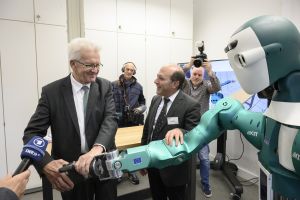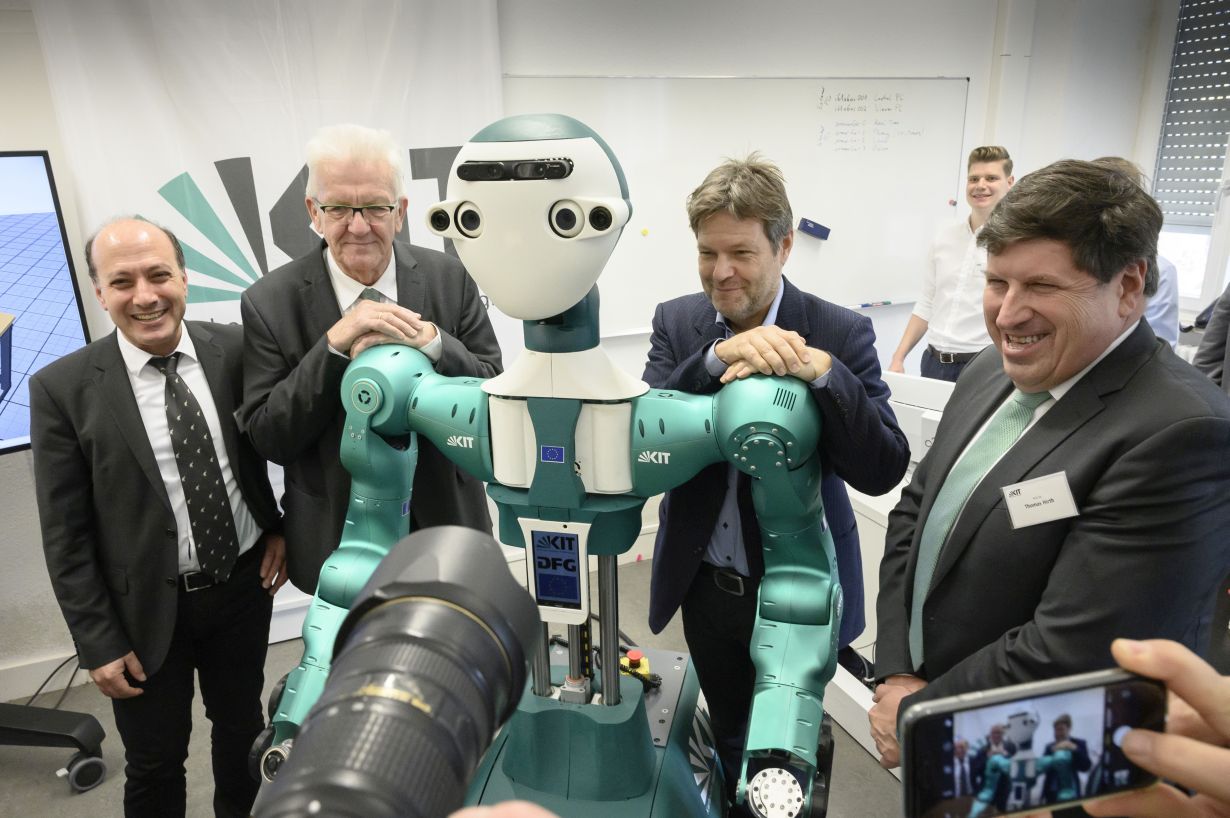Robot technologies and systems that support humans in fulfilling various tasks and learn from them with the help of methods of artificial intelligence (AI): This is what scientists of Karlsruhe Institute of Technology (KIT) are working on. During their visit of the KIT Institute for Anthropomatics and Robotics today (November 22, 2019), Minister-President of Baden-Württemberg Winfried Kretschmann and the Federal Chairman of the Green Party, Robert Habeck, informed themselves about the current status of this forward-looking research.
Other photos of KIT taken during this event can be found in the photo album.
“Artificial intelligence probably has the biggest transformative power ever seen by technical progress. We are embracing this technological change and make Baden-Württemberg the pioneer of artificial intelligence. I am really impressed by what I have learned today about the research and development of human-centered systems by means of computer science. The scope of practical applications of robot technologies that will support humans in the medical sector, in industrial production, or mobility is remarkable. With the KIT, we have an excellent institution that is among the best in Germany and guarantees that Baden-Württemberg will remain the pacemaker in artificial intelligence in future,” said Minister-President Winfried Kretschmann.
“Robots and artificial intelligence are developing at breathtaking speed. Great opportunities are associated with digitalization. At the same time, the development gives rise to new legal and ethic questions. Transparency and liability regulations are required. In principle, decisions interfering with basic rights should be taken by humans – in democratically agreed upon processes – only and not left to machines and algorithms. It is most enlightening to speak about this field of tension with all stakeholders, like today at KIT. Negotiating how civil liberties and fundamental rights may be protected in times of machine and artificial intelligence will be a growing task of politics in future,” said the Federal Chairman of the Green Party, Dr. Robert Habeck.

“Learning systems and robotics are key technologies already used in our everyday life, but they will further develop at high speed and, hence, force us to think ahead. As regards research and development of AI technologies, we at KIT can rely on a long tradition in both areas, informatics and engineering sciences. This unique combination of disciplines will enable us to decisively contribute to the strength of Baden-Württemberg as a location of AI research. In this connection, also IT security will be an important topic,” said the President of KIT, Professor Holger Hanselka.
“Work on artificial intelligence at KIT is characterized by strong fundamental research as well as by highly application-oriented development in robotics and industrial production as well as by practical solutions for future mobility. This is reflected by numerous startups in this area as well as by the close cooperation with partners in industry,” said KIT’s Vice-President for Innovation and International Affairs, Professor Thomas Hirth.
Machine intelligence is one of the central research topics of KIT’s Institute for Anthropomatics and Robotics (IAR). The ten professorships of the institute cover learning from humans, experience, and multi-modal interaction; processing and translation of natural language; semantic interpretation and evaluation of situations; image processing and pattern recognition; recognition of actions and intentions; modeling of uncertainties; as well as engineering of technical systems with holistic software-hardware architectures. Research findings are applied in humanoid robotics, medical robotics, service robotics, and industry robotics, in human-machine interfaces, and assistive technologies for humans with physical restrictions.
“Robotics plays a central role in studying artificial intelligence, as understanding of intelligence without interaction of a body with the physical world is impossible in the long term. That is why embodied AI is in the focus of our research. It is aimed at creating robots with cognitive capabilities and humanoid motion intelligence,” said Professor Tamim Asfour, IAR. “The methods required for this purpose extend far beyond the mere application of intelligent algorithms to large datasets. They have to consider physical interaction with the environment and perception-action loops in order to be capable of learning and to constantly improve the behavior of a robot.”
During the visit, IAR researchers presented the robots of the ARMAR family as well as assistive technologies, such as personalized, smart hand prostheses and exoskeletons.
ARMAR-6, the humanoid robot developed by KIT, can work hand in hand with humans contrary to conventional industrial robots that have to be operated behind a safety guard. By observation, ARMAR-6 learns to handle new tools. It is capable of constantly improving its capabilities by observation, by natural language instructions, or own experience. It recognizes when a person needs help and offers it proactively. ARMAR-3 can help in the kitchen, get milk out of the fridge, prepare a dough, and or fill a dishwasher.
The KIT robot family also includes assistive technologies close to the body in the form of exoskeletons (robots to wear) that relieve humans doing heavy work. Important topics are the recognition of the intention of the human being and the corresponding support as well as the interfaces between exoskeleton and human body. Applications in the rehabilitation sector are envisaged.
Moreover, IAR researchers work on the development of smart prosthetic hands: A camera in the palm records the object to be grasped with help of a deep neural network and selects the right grip. Upon confirmation by the user, the hand executes this grip automatically.
More information:
KIT‘s Institute for Anthropomatics and Robotics: https://www.informatik.kit.edu/1323.php
H2T High-Performance Humanoid Technologies Group: https://h2t.anthropomatik.kit.edu/english/index.php
More photos of this event at KIT can be found in the photo album.
In close partnership with society, KIT develops solutions for urgent challenges – from climate change, energy transition and sustainable use of natural resources to artificial intelligence, sovereignty and an aging population. As The University in the Helmholtz Association, KIT unites scientific excellence from insight to application-driven research under one roof – and is thus in a unique position to drive this transformation. As a University of Excellence, KIT offers its more than 10,000 employees and 22,800 students outstanding opportunities to shape a sustainable and resilient future. KIT – Science for Impact.

